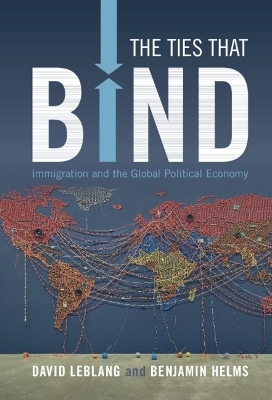
The Ties That Bind
Immigration and the Global Political Economy
Seiten
2023
Cambridge University Press (Verlag)
978-1-009-23322-4 (ISBN)
Cambridge University Press (Verlag)
978-1-009-23322-4 (ISBN)
Migration is the central domestic and global political issue of the day, yet its causes and consequences are poorly understood. This book explores the political, economic, and social factors contributing to migration, the ways migration helps foster global economic exchange, and the role remittances play in the global circulation of people.
Migration is among the central domestic and global political issues of today. Yet the causes and consequences - and the relationship between migration and global markets – are poorly understood. Migration is both costly and risky, so why do people decide to migrate? What are the political, social, economic, and environmental factors that cause people to leave their homes and seek a better life elsewhere? Leblang and Helms argue that political factors - the ability to participate in the political life of a destination - are as important as economic and social factors. Most migrants don't cut ties with their homeland but continue to be engaged, both economically and politically. Migrants continue to serve as a conduit for information, helping drive investment to their homelands. The authors combine theory with a wealth of micro and macro evidence to demonstrate that migration isn't static, after all, but continuously fluid.
Migration is among the central domestic and global political issues of today. Yet the causes and consequences - and the relationship between migration and global markets – are poorly understood. Migration is both costly and risky, so why do people decide to migrate? What are the political, social, economic, and environmental factors that cause people to leave their homes and seek a better life elsewhere? Leblang and Helms argue that political factors - the ability to participate in the political life of a destination - are as important as economic and social factors. Most migrants don't cut ties with their homeland but continue to be engaged, both economically and politically. Migrants continue to serve as a conduit for information, helping drive investment to their homelands. The authors combine theory with a wealth of micro and macro evidence to demonstrate that migration isn't static, after all, but continuously fluid.
David Leblang is Ambassador Henry Taylor Professor of Politics and Professor of Public Policy at the University of Virginia. Benjamin Helms is Postdoctoral Fellow at the Institute for Politics and Strategy at Carnegie Mellon University.
1. Introduction: immigration and globalization; 2. Origins: why do people migrate?; 3. Destinations: where do migrants go?; 4. Diaspora bonds: global migration and international investment; 5. Origin statecraft: remittances and diaspora engagement; 6. Destination statecraft: labor market policy and the regulation of migration; 7. Conclusion: migration and the future of globalization.
| Erscheinungsdatum | 30.01.2023 |
|---|---|
| Zusatzinfo | Worked examples or Exercises |
| Verlagsort | Cambridge |
| Sprache | englisch |
| Maße | 157 x 235 mm |
| Gewicht | 530 g |
| Themenwelt | Sozialwissenschaften ► Politik / Verwaltung ► Europäische / Internationale Politik |
| Sozialwissenschaften ► Soziologie | |
| Wirtschaft ► Volkswirtschaftslehre ► Wirtschaftspolitik | |
| ISBN-10 | 1-009-23322-X / 100923322X |
| ISBN-13 | 978-1-009-23322-4 / 9781009233224 |
| Zustand | Neuware |
| Haben Sie eine Frage zum Produkt? |
Mehr entdecken
aus dem Bereich
aus dem Bereich
Studienbuch
Buch | Hardcover (2023)
De Gruyter Oldenbourg (Verlag)
CHF 62,90
erfolgreiche Interessenvertretung durch Prozesskompetenz im komplexen …
Buch | Hardcover (2023)
Wiley-VCH (Verlag)
CHF 58,75


